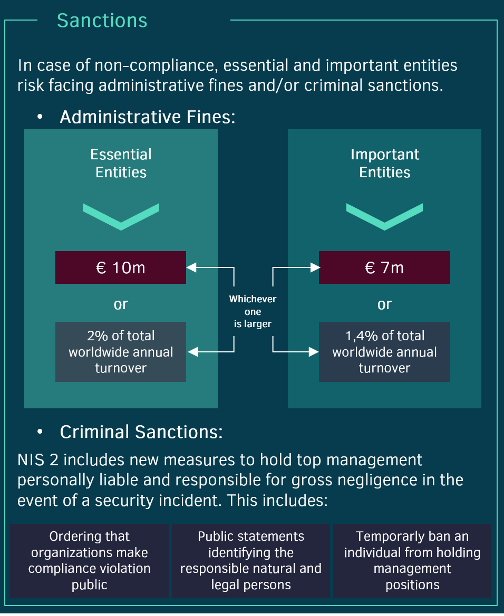
European Cyber Security Directive NIS2 – your way to cyber threat resilience
As the digital landscape evolves, so do the threats that can compromise it. In response, the European Union has introduced the NIS2 Directive, a significant overhaul of the Network and Information Systems (NIS) Directive of 2016. This new regulation aims to strengthen cybersecurity across the EU. Understanding why NIS2 should be prioritized, its goals, who is affected, and what measures organizations need to implement is crucial for navigating the modern cybersecurity terrain.
Why organization need to prioritize NIS2
The urgency of prioritizing NIS2 cannot be overstated. Cyberattacks are becoming increasingly sophisticated, with far-reaching consequences for businesses, governments, and individuals. Recent high-profile breaches and ransomware attacks highlight vulnerabilities in critical infrastructure and essential services. The NIS2 Directive is designed to address these vulnerabilities, ensuring a more robust and resilient cybersecurity framework.
Prioritizing NIS2 is essential for several reasons:
- Enhanced Security: Strengthening cybersecurity measures to protect organizations against the growing threat landscape and minimizing potential disruptions and economic losses.
- Legal Compliance: Non-compliance with NIS2 can result in substantial fines and legal repercussions, making adherence not just a best practice but a legal necessity.
- Trust and Reputation: Organizations that prioritize cybersecurity build trust with customers and stakeholders, enhancing their reputation and competitive edge.
- Operational Resilience: Implementing robust cybersecurity measures ensures continuity of services, even in the face of cyber threats, maintaining operational stability.

From Compliance to Resilience: The Imperative of NIS2
NIS2 aims to address the shortcomings of its predecessor and adapt to the evolving digital environment. Its primary goals include:
- Broadening the Scope: NIS2 extends its coverage to more sectors and types of entities, including medium and large enterprises in industries like healthcare, energy, transport, and digital infrastructure.
- Improving Incident Response: The directive mandates improved incident reporting and response protocols to ensure swift and effective action against cyber threats.
- Standardizing Security Measures: NIS2 seeks to harmonize cybersecurity requirements across member states, reducing discrepancies and ensuring a consistent level of protection.
- Enhancing Cooperation: The directive promotes greater collaboration between EU member states, facilitating information sharing and coordinated responses to cyber incidents.
- Strengthening Supply Chain Security: Recognizing the interconnected nature of modern supply chains, NIS2 includes provisions to secure these networks against cyber risks.
“Achieving success with NIS2 requires a holistic approach: understanding regulatory demands, implementing comprehensive security measures, and fostering a culture of continuous improvement and vigilance.”
Peter Allan
Who Is Affected by NIS2? NIS2 Compliance: Which Industries and Organizations are in the Spotlight?
The NIS2 Directive has a broad impact, affecting a wide range of sectors and organizations across the EU. Entities that fall under its scope include:

Less than 150 days left to comply with European Cyber Security Directive NIS2
accilium supports organizations along their journey towards NIS2 compliance
Organizations affected by NIS2 must take several steps to ensure compliance and bolster their cybersecurity posture. Based on where your organization start along the way to NIS2 compliance and resilience, accilium follows a flexible approach proven successful.
- Conduct a Risk Assessment: Identify potential cyber threats and vulnerabilities within your organization to understand the risk landscape.
- Implement Security Measures: Adopt robust security practices, including network and information system security, access controls, and data encryption.
- Develop Incident Response Plans: Establish clear protocols for detecting, reporting, and responding to cybersecurity incidents promptly and effectively.
- Enhance Employee Training: Educate staff on cybersecurity best practices and the importance of vigilance in preventing cyber threats.
- Collaborate and Share Information: Participate in information-sharing initiatives with other organizations and government bodies to stay informed about emerging threats and best practices.
- Reviews and compliance support: Continuously monitor and evaluate your cybersecurity measures to ensure they remain effective and up to date with evolving threats.
“Effective NIS2 implementation depends on dedicated training, clear communication, and strong leadership commitment. accilium combines these factors with deep knowledge in change and communication and the technical requirements to ensure the project’s success.”
Alex Rinner
Time is short to close the remaining gaps
The NIS2 Directive represents a significant step forward in the EU’s efforts to enhance cybersecurity across its member states. Early adoption of NIS2 guidelines not only bolsters organizational resilience but also signals a commitment to proactive cybersecurity measures, fostering trust among stakeholders and partners. By embracing NIS2, companies can cultivate a culture of innovation, continually refining their security protocols to stay ahead of emerging risks.
Furthermore, compliance with NIS2 not only safeguards against operational disruptions but also shields against potential financial penalties and reputational damage associated with non-compliance. This alignment with regulatory standards not only ensures legal adherence but also positions organizations as responsible actors within the digital ecosystem.
As the compliance deadline approaches on October 17, 2024, organizations are urged to expedite their efforts in enhancing cybersecurity posture, recognizing it as a strategic imperative for ensuring the resilience and trustworthiness of Europe’s digital infrastructure. Through concerted action and adherence to NIS2 standards, businesses can pave the way for a more secure and resilient digital future in the EU.
Download our full guide by filling up the form below!

Peter Allan
Managing Partner

Alex Rinner
Manager





 ISO/IEC 27001:2013 certified
ISO/IEC 27001:2013 certified